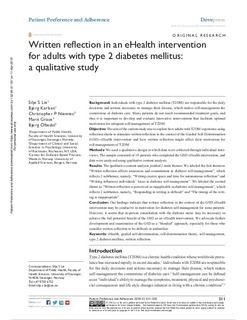| dc.contributor.author | Lie, Silje Stangeland | |
| dc.contributor.author | Karlsen, Bjørg | |
| dc.contributor.author | Niemiec, Christopher P | |
| dc.contributor.author | Graue, Marit | |
| dc.contributor.author | Oftedal, Bjørg Frøysland | |
| dc.date.accessioned | 2018-06-06T09:06:53Z | |
| dc.date.available | 2018-06-06T09:06:53Z | |
| dc.date.created | 2018-03-19T07:55:41Z | |
| dc.date.issued | 2018-02 | |
| dc.identifier.citation | Lie, S.S. et al. (2018) Written reflection in an eHealth intervention for adults with type 2 diabetes mellitus: a qualitative study. Patient Preference and Adherence, 12, pp. 311-320. | nb_NO |
| dc.identifier.issn | 1177-889X | |
| dc.identifier.uri | http://hdl.handle.net/11250/2500549 | |
| dc.description.abstract | Background: Individuals with type 2 diabetes mellitus (T2DM) are responsible for the daily decisions and actions necessary to manage their disease, which makes self-management the cornerstone of diabetes care. Many patients do not reach recommended treatment goals, and thus it is important to develop and evaluate innovative interventions that facilitate optimal motivation for adequate self-management of T2DM.
Objective: The aim of the current study was to explore how adults with T2DM experience using reflection sheets to stimulate written reflection in the context of the Guided Self-Determination (GSD) eHealth intervention and how written reflection might affect their motivation for self-management of T2DM.
Methods: We used a qualitative design in which data were collected through individual interviews. The sample consisted of 10 patients who completed the GSD eHealth intervention, and data were analyzed using qualitative content analysis.
Results: The qualitative content analysis yielded 2 main themes. We labeled the first theme as “Written reflection affects awareness and commitment in diabetes self-management”, which reflects 2 subthemes, namely, “Writing creates space and time for autonomous reflection” and “Writing influences individuals’ focus in diabetes self-management”. We labeled the second theme as “Written reflection is perceived as inapplicable in diabetes self-management”, which reflects 2 subthemes, namely, “Responding in writing is difficult” and “The timing of the writing is inappropriate”.
Conclusion: Our findings indicate that written reflection in the context of the GSD eHealth intervention may be conducive to motivation for diabetes self-management for some patients. However, it seems that in-person consultation with the diabetes nurse may be necessary to achieve the full potential benefit of the GSD as an eHealth intervention. We advocate further development and examination of the GSD as a “blended” approach, especially for those who consider written reflection to be difficult or unfamiliar. | nb_NO |
| dc.language.iso | eng | nb_NO |
| dc.publisher | Dove Press | nb_NO |
| dc.rights | Navngivelse-Ikkekommersiell 4.0 Internasjonal | * |
| dc.rights.uri | http://creativecommons.org/licenses/by-nc/4.0/deed.no | * |
| dc.subject | eHealth | nb_NO |
| dc.subject | selvstyring | nb_NO |
| dc.subject | diabetes | nb_NO |
| dc.subject | diabetes type 2 | nb_NO |
| dc.subject | diabetes mellitus | nb_NO |
| dc.title | Written reflection in an eHealth intervention for adults with type 2 diabetes mellitus: a qualitative study | nb_NO |
| dc.title.alternative | Written reflection in an eHealth intervention for adults with type 2 diabetes mellitus: a qualitative study | nb_NO |
| dc.type | Journal article | nb_NO |
| dc.type | Peer reviewed | nb_NO |
| dc.description.version | publishedVersion | nb_NO |
| dc.subject.nsi | VDP::Medical disciplines: 700 | nb_NO |
| dc.source.pagenumber | 311-320 | nb_NO |
| dc.source.volume | 12 | nb_NO |
| dc.source.journal | Patient Preference and Adherence | nb_NO |
| dc.identifier.doi | 10.2147/PPA.S154612 | |
| dc.identifier.cristin | 1573756 | |
| dc.relation.project | Norges forskningsråd: 231065 | nb_NO |
| cristin.unitcode | 217,13,0,0 | |
| cristin.unitname | Det helsevitenskapelige fakultet | |
| cristin.ispublished | true | |
| cristin.fulltext | original | |
| cristin.qualitycode | 1 | |

